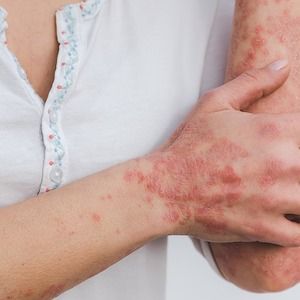Eczema, Psoriasis Associated with Mental Health Struggles for Adult Patients
This new data from the UK suggests possible opportunities for preventing anxiety and depression for those with eczema or psoriasis by addressing modifiable risk factors such as sleep.

Psoriasis and eczema are linked to higher incidence of both anxiety and depression in adults, according to recent findings, with potential mediation being possible through factors such as sleep quality.1
This new research was found through a new study examining the risk factors for mental health issues among patients with either skin disease, helping to identify the population groups which are at the most risk.
This study was seen as invaluable, given that most prior research had not assessed temporality enough, and the study’s investigators noted a general lack of data on the effects of psoriasis on mental illness risk.2 Given this need, the study was authored by Alasdair D. Henderson, from the Department of Non-Communicable Disease Epidemiology at the London School of Hygiene & Tropical Medicine.
“Therefore, we conducted large, matched-cohort studies using routinely collected UK primary care records to better understand why and when new-onset anxiety or depression occurs in over 5 million UK adults with and without eczema/psoriasis,” Henderson and colleagues wrote.
Background and Findings
The investigators conducted 2 matched cohort studies and utilized primary care electronic health records drawn from the UK's Clinical Practice Research Datalink (CPRD GOLD) to assess the elements of risk for mental illness in those with atopic eczema or psoriasis, as well as to find populations with greater risk than others.
The research team’s study spanned the years 1997 - 2019 and they included information on over 18 million people, recording individual diagnoses, characteristics, and prescriptions. The team included eligible adults (≥18 years) who had been registered with a practice meeting CPRD quality-control standards.
The investigators used cohorts of patients with and without psoriasis or eczema, with each of the exposed patients matching up to 5 who did not have the condition. The cohorts were then divided into ones with anxiety or depression codes and ones without such diagnoses before study entry.
In order to find patients with atopic eczema, a validated algorithm which needed diagnostic eczema codes as well as records of eczema therapies was utilized by the team. In a similar manner, individuals with reported psoriasis were found based upon diagnostic codes, and anxiety or depression examples were found with diagnostic or symptom morbidity codes.
Several different covariates were considered by the investigators, including sex, comorbidities, age, deprivation, Charlson comorbidity index, and patient ethnicity. Mediators such as harmful alcohol use, body mass index (BMI), and status of smoking were also used.
In the research team’s eczema analyses, further mediators which were used included sleep problems and high-dose oral glucocorticoids. Cox regression, which was stratified by matched sets, was employed to estimate hazard ratios (HRs) for the link between eczema/psoriasis and anxiety/depression.
The team noted that they constructed models which ranged from minimally-adjusted to fully-adjusted for confounding variables and possible mediators. They conducted sensitivity analyses, using ethnicity as a confounder and considering primary-care consultation timing. The investigators assumed the hazard of eczema/psoriasis on anxiety/depression to be consistent over time, with proportional hazard assumptions tested.
Overall, the investigators ended up assembling 2 arms of participants—1 with eczema (with 1,032,782) and another without (with 4,990,125), and another with psoriasis (with 366,884) and one without (with 1,834,330). Within the eczema arm, sleep quality was found to be distinctly uneven, given that those with eczema showed twice the rate of poor sleep versus those without, including over 20% with reported severe cases of eczema.
The research team, after accounting for possible influences, noted that both eczema and psoriasis were linked to higher anxiety levels (adjusted HR [95% CI]: eczema 1.14 [1.13 – 1.16], psoriasis 1.17 [1.15 – 1.19]) and depression (adjusted HR [95% CI]: eczema 1.11 [1.1 – 1.12], psoriasis 1.21 [1.19 – 1.22]).
They additionally found that these greater risks were shown to not be constant over time and that they were notably elevated in the first year following study entry.
“Future research into this problem should aim to quantify the relative contributions of these mediators and adjust for further factors that were not included in this study,” they wrote. “Our results suggest that incorporating specific strategies to address problems with insomnia in atopic eczema may be helpful in relation to mental health problems.”
References
- Henderson, A.D., Adesanya, E., Mulick, A. et al. Common mental health disorders in adults with inflammatory skin conditions: nationwide population-based matched cohort studies in the UK. BMC Med 21, 285 (2023). https://doi.org/10.1186/s12916-023-02948-x.
- Adesanya EI, Matthewman J, Schonmann Y, Hayes JF, Henderson A, Mathur R, et al. Factors associated with depression, anxiety and severe mental illness among adults with atopic eczema or psoriasis: a systematic review and meta-analysis. Br J Dermatol. 2022;:ljac132.